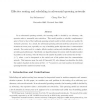Free Online Productivity Tools
i2Speak
i2Symbol
i2OCR
iTex2Img
iWeb2Print
iWeb2Shot
i2Type
iPdf2Split
iPdf2Merge
i2Bopomofo
i2Arabic
i2Style
i2Image
i2PDF
iLatex2Rtf
Sci2ools
148
click to vote
ALGORITHMICA
2005
2005
Effective Routing and Scheduling in Adversarial Queueing Networks
In an adversarial queueing network, the incoming traffic is decided by an adversary, who operates under a reasonable rate restriction. This model provides a valuable, complementary point of view to that of the traditional queueing network model in which arrivals are modeled by stochastic processes. As a result, the adversarial queueing network model has attracted a lot of attention in recent years, especially as a way of modeling packet injections into a communication network. Our main result is a simple, effective packet routing and scheduling algorithm with a provably-good performance. Specifically, our algorithm keeps the system stable (bounded number of packets in the system), with the bound on the number of packets in the system that is O((1 r)-1 ), where r can be interpreted as the arrival rate of the packets into the communication network. This improves upon the work of Gamarnik [12], who designed an algorithm for which the number of packets in the system is O((1 - r)-2 ); more...
Related Content
| Added | 15 Dec 2010 |
| Updated | 15 Dec 2010 |
| Type | Journal |
| Year | 2005 |
| Where | ALGORITHMICA |
| Authors | Jay Sethuraman, Chung-Piaw Teo |
Comments (0)

